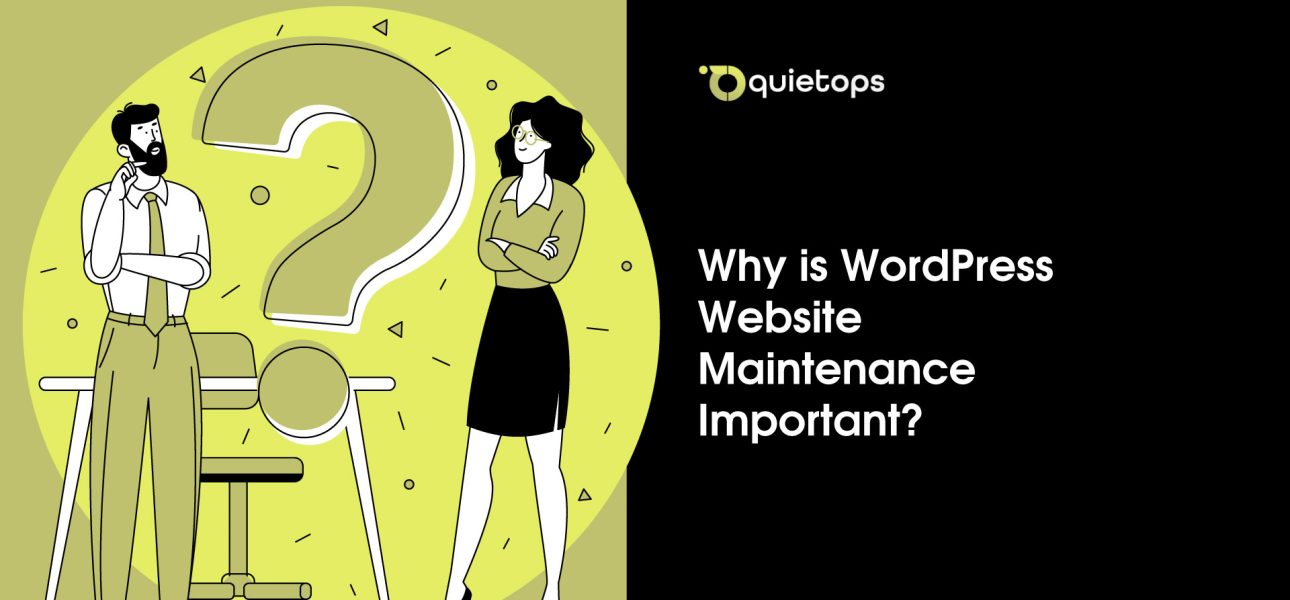TL;DR
A site that is well cared for stays fast. This is very important for both your users and search engines like Google. It loads rapidly if you clean it often, compress images, and handle cache properly. A speedy site not only feels wonderful, but it also gets better rankings, keeps users on the site longer, and creates trust. Another important reason is mobile performance. Smartphones send more than 60% of all web traffic. If users don’t keep up with regular maintenance, they can see broken layouts, slow pages, or buttons that don’t work. You need to keep your mobile site up to date so that it works as well as your desktop site.
Trust is also very important. Dead ends, broken links, and pages that are out of date make a terrible impression. Maintenance maintains your site looking good and working well, which makes visitors trust it more. The laws that govern things like GDPR and CCPA are always changing. By maintaining your policies, cookie notices, and data practices up to date, maintenance helps you follow these rules. If you get behind here, you could face expensive fines.
Even the best-built sites might slow down over time. Old comments, big media files, and unused plugins build up. Regular maintenance gets rid of the digital garbage, which keeps your site and dashboard working properly. A strong maintenance strategy keeps things in order behind the scenes. Checklists, schedules, and team responsibilities make ensuring that maintenance is done on time and nothing is missed.
Your SEO benefits are safe, too. You need to pay attention to fixing broken links, updating metadata, and keeping up with changes in keywords on a regular basis. Your traffic will suffer without it. Don’t forget about hosting and domains. You might skip renewals, your servers might collapse, and downtime might sneak up on you. To keep things running well, maintenance keeps track of these things. Consistency is important for your brand image. When your images or logos don’t match, it sends mixed signals. Keeping up with maintenance helps maintain your look, tone, and content in sync.
Spam and bad stuff can get in quickly. Regular upkeep keeps your public spaces clean and on-brand. Maintenance also helps you make smarter choices. If your analytics tools stop working, your strategy is blind. Keeping your data flowing correctly helps you get smarter.
This is what good maintenance actually protects:
1. Regular updates protect your site
Threats to your security don’t care about your schedule. Bots and malware often attack WordPress sites to find weak spots.
A site that is kept up is safer:
- Updates fix known security holes.
- Active monitoring lets you spot questionable activities early on.
- Hacker’s way in is through old parts
2. It makes sure everything works
Even little problems can turn into full-blown outages if they aren’t fixed.
Maintenance makes sure that visitors always see your site the way you want them to:
- Without upgrades, plugins won’t work together anymore.
- Forms for getting in touch and checkout pages could break without anyone noticing.
- Code that isn’t kept up can get worse with time.
3. Shields business assets from risk
Your website probably gets you leads, sales, or bookings. Downtime or broken features cost you money right away.
Every problem with technology costs money:
- Crashes during launches or promotions stop progress.
- CTAs that don’t work represent missed chances
- Problems with the site during checkout cause some to leave their carts.
4. Maintenance makes the site work better
The speed of a website affects both UX and SEO rankings. Regular maintenance is necessary to keep up strong performance and competitive SEO.
Maintenance makes things work better by:
- Cleaning up databases (removing modifications, spam, and transients) to make them lighter.
- To make pages lighter, photos are compressed and loaded slowly.
- Managing caching layers to make it faster to visit again.
- Reducing the size of scripts and styles by minifying them.
5. Provides a smooth experience for people on mobile
If a site isn’t kept up to date, it can still annoy mobile consumers, even if it looks great on a desktop.
Keeping your mobile device in good shape is important for its success:
- Responsive behavior must be taken into account when making design changes
- People generally don’t check how long it takes for mobile pages to load.
- Bugs that make things hard to use can stop conversions on phones.
6. It stops all data loss
Backups are your last line of defense, but they only work if you test and keep them up to date.
A backup that works gives you peace of mind. It stays that way with maintenance:
- Automated backups can fail without anyone knowing.
- You should check restores on a frequent basis.
- You have to keep backups off-site.
7. It keeps navigation and user trust intact
Broken links or dead sites are the quickest way to annoy users.
Users come back when their trips go smoothly:
- Link rot hurts your SEO and your reputation.
- Visitors get confused by old menus
- When navigation isn’t consistent, people don’t stay engaged.
8. It helps you stay inside the law
Rules change all the time. Your site needs to change with them.
Keeping your business legally safe is important:
- Privacy and data rules (GDPR, CCPA) change all the time.
- Terms, policies, and cookie banners must match what you really do.
- If you don’t follow the rules, you could be fined or sued.
9. Maintenance makes content work better
People don’t simply get bored with old content; it also hurts your authority.
New content shows that you are alive and well:
- Old information makes people less likely to believe you.
- Calls to action that don’t work destroy conversions
- Readers may be confused or misled by old blog posts.
10. It keeps your tools safe and works well
Themes and plugins need to be taken care of.
Only use tools that will develop with you:
- Tools that are left lying about can generate security weaknesses.
- Tools that aren’t being used drag down your site.
- Not getting updates causes difficulties in compatibility
11. It limits who can access the system and lowers risk
People sometimes forget about user permissions after they set them.
Regular reviews make sure that access stays in the proper hands:
- People who used to be on the team may still have access.
- Wrong roles can let people make changes they shouldn’t be able to.
- Every account might be a point of breach
12. Site speed goes up with maintenance
If you don’t clean and tweak them, even fast sites will slow down over time.
Websites that load quickly need regular maintenance:
- Data and media that aren’t used build up
- Old scripts make things run slowly
- You need to set up optimization tools on a regular basis.
13. It makes WordPress maintenance more predictable and accountable
If you don’t have an organized maintenance approach, you could miss crucial activities like updating plugins or scanning for security holes. This causes defects, outages, or security holes, and no one knows who is responsible for addressing them. With systematic WordPress maintenance, things like scanning for malware, renewing SSL certificates, and testing staging sites become more predictable and accountable. This lowers risk and makes things more reliable for everyone involved. Stops fights and breaks
A set maintenance strategy takes the guessing out of it:
- Checklists make guarantee that important chores like updating WordPress core, plugins, themes, and making backups every day are done on time.
- Roles that are assigned make it clear who is in charge of things like keeping an eye on uptime, optimizing the database, or responding to security alarms.
- It’s easier for teams to keep track of changes, fix problems, and work together when they have documentation.
14. Ongoing maintenance keeps SEO performance high
You can’t just do search engine optimization once and be done with it. Search engines like Google change their algorithms all the time, and if your site doesn’t keep up, your ranks can drop drastically. SEO success isn’t about getting a sudden boost; it’s about being consistent. Regular maintenance keeps your site optimized, visible, and competitive on search engine results pages.
If you don’t do frequent SEO work on your site, it could lose visibility:
- Links that don’t work hurt the user experience and degrade your domain authority.
- Using old keywords makes your content less relevant and makes it less likely to rank.
- If your metadata (titles, descriptions, alt text) is missing or wrong, it can impact your click-through rates and change how search engines read your sites.
- Images that aren’t optimized and pages that take a long time to load hurt both user experience and SEO ratings.
- To stay at the top of the rankings, you need to keep an eye on mobile-friendliness and key web vitals all the time.
15. Keeps your your domain and hosting safe
Your domain name and hosting environment are the most important parts of your online presence. If you don’t take care of them, it could cost you a lot of money. Even tiny mistakes can have big effects, including losing your domain, downtime, or losing data. Keeping your domain, hosting, and infrastructure safe is an important component of keeping your website up and running. That’s how you keep uptime, trust, and years of hard work in the digital world.
Ongoing maintenance helps you stay away from these things:
- If you don’t renew your domain on time, it could expire, and then someone else could register it, which could take over your brand or traffic.
- SSL certificates that have expired might make your site less secure and less trustworthy, which can affect SEO and scare away visitors.
- If you don’t pay attention to hosting issues like hitting storage restrictions or using an old version of PHP, your site could run slowly or be open to attack.
- If you don’t plan ahead for hosting changes, you could lose data, have broken links, or make mistakes in your configuration.
16. Keeps a strong and steady brand image
People generally see your website before anything else about your brand. Visitors may doubt your professionalism and reliability if your website seems old, inconsistent, or badly kept, even if your product or service is wonderful.
Regular maintenance keeps your brand looking professional and trustworthy:
- Design components that don’t match up, including old logos, colors, or typefaces, can make things confusing and make it harder for people to remember your brand.
- If your sites send out mixed messages, it might make your firm look chaotic or unsure of what it does.
- Images that are low quality or not organized show that you don’t pay attention to the details.
- If you don’t keep up with design changes, your site will look old-fashioned, especially when compared to competitors with new, modern designs.
17. Keeps the online world clean and respectable
Your website, like a neighborhood, needs regular maintenance to stay trustworthy and easy to use. Comment sections, forums, and product reviews are examples of areas that can get messy or toxic very fast if they aren’t watched. A site that is clean and well-moderated demonstrates that you care. Digital “housekeeping” is part of website upkeep that keeps your online home safe, welcoming, and in line with your brand.
Here are some things that ongoing moderation helps stop:
- Spam in comments or contact forms makes the site look messy and drives people away.
- Users posting inappropriate or harmful content might hurt the reputation of your brand.
- Reviews and questions that are old or unresolved show that you don’t care about your customers and don’t provide good service.
- Visitors will not trust you if there is no moderation since it shows that no one is in charge.
18. Enables better tracking insights
Your metrics are only helpful if they are correct and up to date.
Excellent data helps maintenance make excellent decisions:
- Bad strategy comes from not tracking things properly.
- Broken measurements hide chances for growth.
- Validation is needed for goal monitoring
19. Prevents bugs and breaks
WordPress links everything together. A little adjustment can start a chain reaction.
Regular checks catch little problems early:
- Updates to plugins can break layouts.
- Upgrading a server can cause problems with the database.
- Without inspection, problems get worse quickly.
20. Maintenance makes things more reliable
“It’s fine for now” is not a plan for keeping things in good shape:
- Even decent sites get worse over time if you don’t pay attention to them.
- Things that work now could not work tomorrow.
- Care on a regular basis turns turmoil into trust.
Last Thoughts
It’s not about being perfect when you maintain WordPress; it’s about being ready. Your website shows off your business in many ways, from how well it works to how safe it is. It should get the same care and attention as any other important asset.
If you don’t have the time, skills, or desire to do it yourself, think about hiring professionals to do it for you. QuietOps provides full-service WordPress maintenance to make sure your site runs smoothly.







